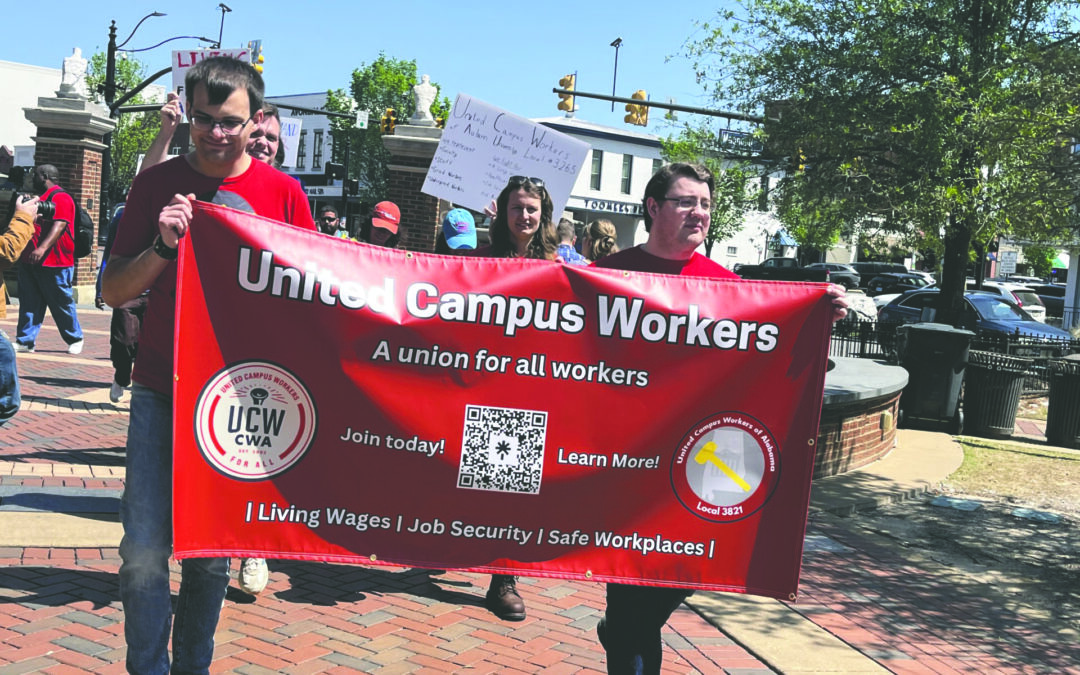BY MICHAELA YIELDING
FOR THE OBSERVER
AUBURN — On Wednesday, April 9, the United Campus Workers (UCW) of Auburn University held a rally and petition signing at Toomer’s Corner in downtown Auburn. Starting at 10:30 a.m., the group rallied for the university to raise the minimum wage to $17.50, eliminate graduate student fees, increase graduate student stipends to $25,000, conduct cost of living adjustments, provide subsidies for childcare and family and provide a fairer promotion timeline for employees.
For an hour, Auburn UCW peacefully rallied, encouraging onlookers to learn more about their demands and to sign their petition. The organization had planned to personally deliver the petition to AU President Christopher Roberts and CFO Kelli Shomaker at the president’s office in Samford Hall. However, Roberts and Shomaker informed UCW organizers the day before that the two would be out of the office during the planned time of delivery. Kevin Robinson, AU’s Vice President for Institutional Compliance and Security, received the petition on their behalf.
Though the petition was delivered to a member of Roberts’ office, members of UCW still voiced their disappointment the president wasn’t there.
“Of course, we wanted to deliver the petition [to Roberts and Shomaker],” said Brooks Howe, a graduate student in Auburn’s physics department and an Auburn UCW organizer. “We’re only engaging in peaceful protests, so if there’s really nothing to be worried about — we want to end up just asking the president to do the right thing and asking the CFO to do the right thing. We’re definitely not trying to work against them. We would rather work with them, so that’s why we want to set up a meeting with them after this as a follow-up. We wish they were here, but, you know, we can still make sure that the petition gets done.”
According to a press release from Auburn UCW, the petition surpassed the goal of 500 signatures.
Auburn’s UCW has approximately 65 members, according to Roman Vasquez, a graduate student studying theoretical mathematics and an Auburn UCW organizer. UCW is an organization with chapters in 13 states, including almost 5,000 members throughout the southeastern U.S.
Alabama UCW was formed in Tuscaloosa in 2019 at the University of Alabama with the goals of improving campus workers’ wages, healthcare and overall well-being, according to the Alabama UCW website. The Auburn chapter formed in 2020.
The demand for increases in the university’s minimum wage and graduate student stipend comes from a combination of the MIT Living Wage Calculator, the current minimum wage at Auburn and the financial experiences from graduate students.
“There’s no minimum stipend, which is one of the big things we’re asking for,” said Howe. “We’re asking for a minimum of $25,000, which is kind-of the bare minimum to be able to live in this area.”
“The $25,000 for grad students actually was based on LSU, who recently implemented a minimum stipend for their grad students, as well,” Vasquez said. “I believe it was like $24,000 if you’re doing a nine-month [program] and a bit higher if you’re doing a 12-month [program], and we said if they can do 24, we can do 25.”
Auburn UCW also wants AU to raise its minimum wage. This year, on Jan. 1, the campus minimum wage was increased to $15 per hour from $14.50, a rate set in 2022. Auburn UCW is seeking a minimum hourly wage of $17.50.
Vasquez said recent budget cuts by U.S. President Donald Trump’s administration create new obstacles for the Auburn UCW’s goals. Trump signed an executive order calling for the dismantling of the Department of Education, raising concerns about how the university would be able to fund the union’s requests for higher pay.
“It’s a tough environment to be making these sorts of asks,” Vasquez said. “We understand that the university is under a lot of pressure right now. No one knows what to expect next, no one knows what the outcome will be. There’s a lot of uncertainty, but I think that is just yet another reason why it’s so important that campus workers be paid a living wage.”
Another challenge the organization faces is fear — campus workers are afraid of receiving backlash from their superiors if they join the movement, according to Vasquez. However, he said, names of workers who join Auburn UCW are kept confidential.
“No one who has joined has actually been targeted or fired by the administration or anything,” Howe added. “We only engage in peaceful protests and stuff like that, so there’s not a whole lot of backlash in that way.”
The Observer repeatedly reached out for an official comment from Roberts, Shomaker and Jennifer Adams, executive director of communication. University officials did not reply to emails or return phone calls.


